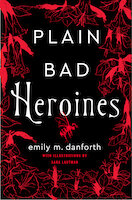Review: The Vanishing Half
/3 stars. What can I say about this that hasn't already been said, more eloquently than I ever could? The Vanishing Half is another must-read from this author, a compelling study of race, family, and identity. Twins Stella and Desiree were born in a small town meant for light-skinned black people, and both of them carry this with them through their upbringing, adolescence, and eventual adulthood, veering in opposite directions until separate from each other, forging different lives. Their daughters, born into different worlds, bounce around each other through happenstance, tightening the tapestry's weave until a full and colorful picture emerges. It's thought-provoking, beautiful, and interesting.
I love Brit Bennett's writing. She takes these huge, thorny themes and writes about them with such ease. The Vanishing Half is so smooth, so flowy, it's almost a trick. I really rooted for her true and distinct characters, occasionally insufferable in understandable ways, as we all are. The way she writes about place, too, felt absolutely crucial to the story's success, from sunny L.A. to cold New York to the small town vibes in Mallard, Louisiana. These details and others, like the glimpses into drag shows and musical theater and medical school, make the snapshots of each arc even more vivid and bright.
Books like this are truly humbling and important. It's probable that I'm deeply underread, but I don't think I've encountered a book that so clearly and plainly explores the ties between race and family. Bennett is certainly not the first - and there were times I honestly felt like The Vanishing Half was a little referential - but that's where she stuck the pin for this one, and it really worked. I have my own thoughts about blood ties, kin, family, however you want to say it, but there's no doubt it does shape your identity, stamping you visibly or invisibly in ways that will never wear off.
So, why 3 stars? I loved the subject matter, the plot, the characters, the ending, the writing style ... but for me, it really came down to my personal reading experience. I dragged my heels a bit, losing interest halfway through. Bennett also tip-toes around using a device she used in The Mothers, writing as a sort of collective voice on behalf of a small town. That sort of thing is not for me, as a preference. I want to be clear though that I'm RECOMMENDING THIS, because it is masterful and worth studying and worth considering long after you finish it.
The Vanishing Half on: Amazon | Bookshop.org | Goodreads










